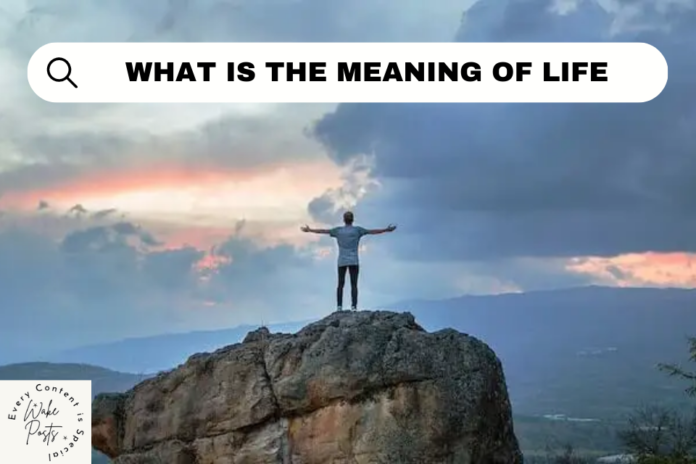“Life” is a word we are all familiar with. We lead it on a daily basis. But when it comes to the meaning of life, it varies from one person to another. It’s the way people lead their perspectives and give them a proper shape.
Thinkers provided answers to this query that are extensive and diverse. Also, in varying degrees, helpful. Friedrich Nietzsche, a philosopher from the 19th century, claimed, for instance, that the issue itself is pointless. This is because, while we are living, we are unable to assess whether our lives are meaningful. It is inconceivable to step beyond the experience of being alive in order to provide an answer.
If you’re looking to find out what is the meaning of life, you’d have to hold onto yourself. Then you can embrace yourself to understand its true meaning. So, let’s take a swirl through a piece of information that might affect the outlook you possess. Overall, this will give you a dimension that you haven’t thought of. This might be the best outlook in your whole life span.
What Does “Meaning” Mean?
We instinctively understand that finding a purpose in our lives is important. We have to do this to thrive. But did we ever hardly pause to consider why. How does meaning affect us? What does “MEAN” mean?
If you’ve ever wondered about these things, you’ve come to the correct place! In this essay, we’ll discuss the purpose of life. Also, its potential sources and how to search for them. Let’s go over all other crucial issues.
Well, when it comes to your perspective, we often don’t understand the real meaning. It’s true that each person holds a different idea and leads their life accordingly. If we elaborate a little more in this regard, you’d probably understand it better.

An Adjective
When you’re talking about the meaning, you’d want to describe it in an adjective form. Let me tell you, and it’s expressive, entirely intended, and intentional. As an adjective, these are the synonyms or meanings that one can come up with.
A Noun
What is meant to be conveyed or suggested, or what is really done so; significance; import. By noun, it is understood as the goal, value, or conclusion of something.
Two Distinct Meanings That Are Combined By Our Brains
- Cause/Effect Meaning: The object moves when you hit it. Your pal strikes you in the face after you tell him his hair is terrible. You do action X, and Y will certainly follow.
To thrive, we all require Cause/Effect relationships. It aids in future forecasting and past learning. Our brain’s rational regions are principally involved in cause-and-effect meaning. For example, science is constantly looking for new Cause/Effect Meanings.
- Better/Worse Meaning: Eating is preferable to going without food. Making money is preferable to going without; rather than robbing, practice sharing. The nature of the principles we consider to be most significant and valuable in our lives has to do with better/worse meanings.
Better/Worse connotation primarily draws on our emotional brain regions. Typically, we gravitate toward things that we perceive as “good” or “better” and that makes us feel good.
Our brains develop both types of meaning in order to aid in our survival. For thousands of years, people had to keep so much in mind. Like where they could find specific foods. How different animals would react to hunting and how the wind picked up. And also how to read the landscape. Additionally, they needed to understand what would make them popular among their group. What would make you more preferred among others?
Meaning is, therefore, nature’s motivational instrument in that sense. Our completing our tasks is guaranteed by evolution. Our activities are all driven by purpose. We will go to great pains to make amends when there is a lot riding on them. Such as when our child is ill and malnourished. For some lofty feeling of purpose, people frequently go as far as offering their life. Meaning has the power to compel people.
What is “Life”?
The scientific definition comes first. Life is a self-organizing chemical that reproduces and transmits its DNA-encoded, developed traits. It has the potential to locally violate the third rule of thermodynamics by reducing local entropy or disorganization.
But what, if anything, is the purpose of life? Whether life is a pointless accident caused by the laws of physics functioning in a meaningless cosmos. Or it is a purposeful “experiment,” are the two alternatives. This can’t be the final step, which is why I say “step.” The situation of existence today is still too chaotic and immature to be the end. And the reason I use the word “experiment” is that life is progressive, meaning that we don’t know what the future holds.
And the reason We use the word “experiment” is just that life is progressive, meaning that we don’t know what the future holds. If the cosmos has a goal at all, it appears to be to investigate what would happen if an evolutionary study were to take place.
The element of existence known as life processes, moves, reacts, judges, and grows (reproduction and metabolism). The fundamental distinction between life and non-life (or non-living entities) is that life requires energy for the growth of its physical and mental components. Anything that develops and finally perishes, or ceases to proliferate and be conscious, is said to have life.
Can we say, for instance, that viruses have consciousness? Yes, to the extent that they respond to stimuli, yet their primary means of survival is through growth and reproduction. Computers are not considered to be living things despite the fact that they are capable of cognition. It is because they cannot reproduce or grow organically.
Therefore, life is not determined by cognition. But rather by multiplication and maturing. Leading to a condition of death that exclusively affects living things.

What is the meaning (purpose) of life, or is that the doubt? That one is very difficult. However, I believe that the standards and expectations we place on life give it its purpose. The purpose of life is to: Do good, Be good, but also to accept good. We have come to reconfirm my Boy Scout credo, give or take a few phrases. Of course, the hazy word in this advice is “good”. But I’ll leave it to the intuition abilities we all possess.
Of course, there are numerous immediately obvious instances of doing well. Such as saving a drowning person or rescuing a crying baby from a trash can.
How To Find Meaning In Your Life?
We advise adopting the following seven stages to start the process of finding your life’s purpose or redirecting a quest that has veered somewhat off track.
1. Examine your diet first
If you informed me you had recently changed your diet and weren’t functioning well. I will inquire about your macronutrient profiling to find out if you are getting enough lipids, minerals, and complex carbs. Doing so in the proper proportions. Similar to this, you should consider whether you are lacking in consistency, aim, or relevance if you feel that your life lacks value. Think about the following:
Do you feel like your life is spinning out of your hands with no discernible pattern? If so, you need to understand coherence properly.
Do you lack exciting, huge plans, aspirations, or concepts for the future?
Do you think it wouldn’t affect things if you vanished, that it wouldn’t make things worse or even better? This is a significant issue.
2. Investigate in the woods
If you notice a gap in a specific region of content, actively look for it. Luckily, philosophical and theological cultures have been teaching people how to do this for centuries. So you are not required to find it out on your own. The four components of a successful life, known as the ashramas in Hinduism, are one of the best-planned approaches. The third is Vanaprastha, which means “retiring to the forest” in Sanskrit. It should start about age 50 and comprises putting aside daily obligations. Do this in order to concentrate more on life’s profound purpose.
By setting aside time each day for the search. You may accomplish a variation of this at any stage of your life. This may entail prayer or devotion for some. Others will need to study texts or consult with experts. Even counselling is involved for better help. However, you must tackle it like you would any other significant objective—by putting in the necessary effort.
3. Solve issues
One will experience greater meaning as the situation grows in size. You will feel more purpose as you put more effort into solving that problem. Finding solutions to issues essentially entails trying to improve the world just a little bit. It can be as simple as renovating your elderly mother’s run-down home. Or as challenging as focusing on the latest significant physics discovery.
Not being choosy is the key here. When we consider how small we are in the grand scheme of the universe, it is simple to believe that there is no value in doing anything unless we are going to safeguard the planet or something. This is merely a diversion. Numerous minor issues that affect everyday life are present all around you.
4. Assist others
The big one is this. Humans are hardwired to flourish in social interactions. According to studies, the strength of our connections is directly correlated with our general well-being, and assisting others is the best method to forge strong bonds with others. Indeed, according to some research, giving things away actually makes us happier than keeping them for ourselves. Oh, right.
As a result, helping others appears to be a “hack” in our brains that increases our sense of purpose and significance. You can advance simply by telling yourself, “If I died, then someone would be better off because I lived.” This statement gives your life significance.

5. Always be learning
Many of us may feel finished with studies, schooling, and overall education after twelve years of formal education, not to add a mini-career arc through university. However, learning ought to be a continuous process.
This doesn’t imply that you have to force yourself to want to study philosophy courses in order to figure out what the point of life is. It’s merely a prodding to begin showing fascination with the world surrounding you.
Research, enquire, and learn more about topics that intrigue you and your desire to study will soon start to expand on its own.
6. Defeat Your Insecurities
The first thing we should acknowledge is that everyone has anxieties.
It can be challenging to detect and classify those fears for what they are sometimes. Working on your vulnerabilities is one of the finest methods to overcome the concerns and worries of life.
Try to be alert, keep an eye out for thought patterns, evaluate your actions, and recognize when anxieties are influencing you.
Your ability to overcome them, avoid acting selfishly, and empower yourself to accomplish tasks that were previously unattainable will increase as you become more conscious of your own fears.
Sense Of Meaning
To my astonishment, the majority of those with whom I have had conversations regarding the purpose of life have expressed a belief that their lives are not important enough. Some even claimed that their life had no purpose at all. However, I frequently found the justifications my interlocutors supplied for their opinions to be flawed.
He is one of many intellectuals throughout history to have struggled with the challenging inquiry, “What is a meaningful life?”
Many, in my opinion, didn’t ask the right questions that might have altered their perspectives or responded in ways that might have helped their situation. (Some of them concurred with me after our chats.) The majority of those who bemoaned the pointlessness of existence even struggled to articulate what they believed the idea to entail.
How can you go about looking for it while not exploring too much if you haven’t yet discovered any sense of significance? The solution is to condense a complex philosophical query into a comprehensible unit. The most efficient way to do this, and one that won’t involve excessive fussing, is to evaluate your life along the following three criteria, as stated by psychologists Frank Martela and Michael F. Steger in The Journal of Positive Psychology in 2016:
Coherence is the way that things fit altogether. This is an awareness that everything in your life occurs for a cause. That doesn’t necessarily indicate you can work recent innovations into your story at the time they occur, but you typically can, so you have trust that you will ultimately be able to.
Targets and ambitions exist for a reason. This is the idea that you are awake so that you can act. Consider aim as your own unique mission statement, such as “I am here to give love lavishly” or “The aim of my existence is to impart the keys to pleasure.”
The intrinsic worth of life is significant. You can feel like your life matters in this way. If you have a lot of meaning, you’re sure that without you, the planet would be a little bit—or maybe a lot—poorer.
Are We Better Off The “Purpose”?
According to the Second Law of Thermodynamics, the enthalpy change of a closed system, which includes the world itself, rises until an equilibrium is achieved. It is possible that God created us and all of our essence for no greater ideal than to help accelerate this method, similar to how soil microbes catalyze the breakdown of organic matter.
It is preferable to have no goal at all than any form of the best estimate, even more conventional, elevating ones like serving God or bettering our karma.
In other words, even if God exists and even if He created us with intelligence in mind (and why should He have? ), we do not know what this clever goal was, and whatever it may have been, we would like to be prepared to do without it, or at the very least to disregard or devalue it.
Because unless we are free to choose our own meaning or objectives, at worst, our existence may have no meaning at all, and at best, it may have some obscure and possibly minor reason that is not meaningful.
You or others may argue that having no goal at all is basically the same as having no reason at all. But this assumes that in order for something to serve a function, it must have been designed with that goal in mind. Furthermore, it must currently be doing so.
Arguments Of Afterlife
Even yet, you might argue that discussing the purpose of life is irrelevant because it serves just as a bridge leading to some sort of everlasting afterlife.
However, we can assemble at least four grounds to refute this claim:
The existence of an endless afterlife that requires the maintenance of the individual ego is not at all obvious.
Living forever is not a goal in and of itself, even if there were such an eternity. The idea of the resurrection only moves the issue further away, leaving us to wonder: What is the point of eternity? Again, we are unsure of the afterlife’s function, if it has one.
Relying on an everlasting afterlife not only puts us off thinking about why we are here, but also prevents us from coming up with a purpose or reasons for what might be the only life we ever have.
An endless afterlife cannot, in and of itself, have any meaning if the shortness or finite nature of human existence is what gives it form and direction (a statement attributed to the philosopher Bernard Williams).
We are, therefore, better off coming up with our own goals or goals irrespective of whether Deity exists, irrespective of whether He assigned us a goal, and whether or not there is an endless afterlife.
In existentialism or Sartrean terminology, whereas for the galet, it is true simply that existence precedes meaning, it is valid for the sock both that essence precedes existence (when the sock is worn on a human foot) and that existence precedes principle (when the sock is used for an unintended purpose (for example, as a bottle sleeve). Either the rock or the sock best describes us as people, but regardless matter which one we are; we are best off developing our personal goals or objectives.
“Subjective” and “Objective” View
Thaddeus Metz, writing in the Stanford Dictionary of Philosophy, classifies those who believe meaning can be determined into four groups. Some people have a god-centred mindset and think that only a god can give meaning.
Others hold a soul-centred perspective, believing that we must retain some aspect after our bodily presence, an essence that gives life purpose. Then there are the “subjectivist” and “objectivist” schools of “naturalists,” who look for significance in a world that is just physically real as understood by science.
Whether these prerequisites are fundamental and global or whether the human mind creates meaning is a point of contention between the two naturalist parties. Though they may not all concur on what they are, objectivists contend that there exist universal truths that have worth.
For instance, some claim that innovation provides value, but others think that virtue, or leading a good life, bestows meaning.
Landau is one subjectivist who believes that certain viewpoints are overly constrained. The meaning may arise from a variety of sources if cognition is the process by which it occurs. The majority of experts on the subject believe that there are sources of meaning outside morality and creativity that are independent of one another. Think about making an intellectual finding, loving your children, playing instruments, and improving your athleticism as just a few instances, suggests Metz.
For subjectivists, the worth of any particular action fluctuates based on who we are and where we are at any given time. They claim that life has a purpose, but that meaning is something we assign to it in our thoughts, and it can evolve through time. According to Landau, meaning is fundamentally a feeling of value that each of us can obtain in our own unique ways—for example, through relationships, creativity, professional success, or compassion, among other things.

Answer Is In The Question
There are further methods as well. In Philosophy Now, Casey Woodling, a professor of philosophy and religious studies at Coastal Carolina University in South Carolina, suggests that the query of meaning and importance itself provides a resolution. “Reflecting on the living of a life, rather than simply living a life, is what gives a human life value or significance,” he adds.
Woodling believes that while seeking ends and goals—such as health, relationships, monetary achievement, and academic success—is all well and good, it lacks true significance. But it’s important to consider why we seek those objectives. A reflective viewpoint allows significance to grow on its own. This is similar to Socrates’ adage that “the unexamined life is not worth living,” adds Woodling. “I would hazard to suggest that an unchecked life is not worth living.”
Another straightforward response to the complex subject of life’s purpose can be found in the Eastern philosophical tradition; this one, however, can only be felt via careful observation of nature. Lao Tzu, a Chinese sage from the sixth century, had the view that the universe provides our worth. It is stated that he recited the Tao Te Ching before fleeing civilization and seeking seclusion in the woods.
He would make the same case as Woodling that achievements and aspirations are not what makes our lives important. He contends that meaning derives from being a creation of the universe itself, contrary to Woodling. There is no effort required.
Lao Tzu suggests a profound grasp of the enigmatic substance of life as opposed to reflection. We are a component of “the way,” which is made of everything and creates everything and can never completely be seen or spoken about, just like rivers and trees are. Whatever role we play in culture, whatever little or much we may accomplish, life is essentially significant from this viewpoint, even though it is not understandable.
Because we are a part of an everlasting and inexplicable chain of creation, we exist among and among living creatures, making life important. He adds that although life can be harsh at times, endurance is what gives it value. According to the Tao, one who perseveres is a man of purpose.
Experience Is More Important Than Meaning
You must realize that when you inquire about the purpose of life, you are merely attempting to arrive at an answer so that you can rest easy tonight since, in the absence of a solution, your intellect worries you.
Being joyously bewildered is a skill that is incredibly pleasant since it shows that your brain is engaged. Your cognition shuts down the moment you draw a conclusion or have an opinion. However, when you are ignorant, you have a completely involved perspective on everything.
Is your involvement in life not important? Does there exist a different method to understand life? Would you truly understand the flavor of the food you are consuming if you were not associated with it?
The majority of people just pay attention to their first mouthful. Following that, they simply guzzle it down without really savoring it. Thus, most people only get their first real experiences with life during their early childhood. After that, they have a reason and a judgment for it all.
Less can be experienced, the more you draw conclusions. We are completely ignorant of all human experience. Only your psychological makeup can give purpose to your life. Your mind seeks significance. Because of the nature of this existence, even if you live here just for a million years, you may still participate and find excitement in it. It will confuse you more and more when you have a more in-depth look at it.
Your inner life requires fullness of experience rather than purpose. The moment you accomplish it, all of these queries will vanish. Without that, you might continue to inquire because you are on the mental stage when you are looking for explanations.
Final Thoughts
Why are we here? What purpose does life serve? What is the meaning of life?
There is no concrete answer to the puzzling problem of life in this article or any other. And it’s all right!
The truth is that the fascinating variety, wonder, and uncertainty of life are a big part of what makes it so enticing. It’s crucial to note that the absence of a convincing response does not imply that it is not worthwhile to continue looking for one.
Each person must go out on their own path to discover what life is all about. Thankfully, people have discovered a wide range of activities, ideas, and behaviors over time that can be fantastic ways to guide us towards the ultimate internal judgment of why we are here.

